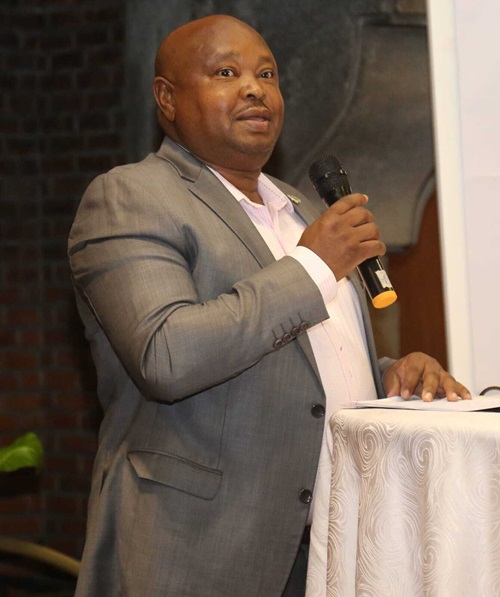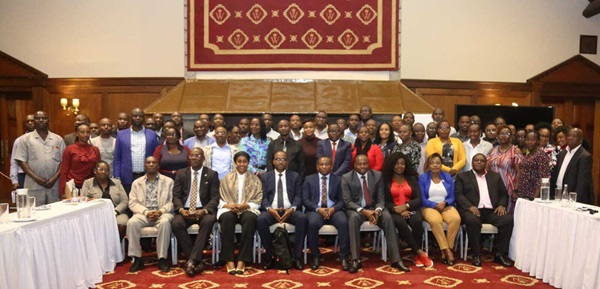Nairobi, 4th October 2024
The Nairobi County Revenue Target Setting Conference concluded its final day with a strong focus on enhancing revenue collection and improving service delivery.
Presentations from Built Environment and Urban Planning, Innovation, and Digital Economy sectors marked the close of the conference.
County Executive for Finance and Economic Planning, Charles Kerich, accompanied by Chief Finance Officer Asha Abdi, praised the sectors for their dedication throughout the four-day event. Mr. Kerich highlighted the importance of prioritizing high-impact revenue streams. “The 80-20 rule, also known as the Pareto Principle, shows that 80% of results come from 20% of inputs. In our case, 80% of our revenue will come from just 20% of our revenue sources. While we should pursue all streams, we must focus our efforts on key areas to meet our target,” he stated.
 He also noted that the county collected Kshs.12.8B last financial year, with a target of Kshs.20B this year. “We know where the revenue is; we need to focus our efforts and make it happen,” he added.
He also noted that the county collected Kshs.12.8B last financial year, with a target of Kshs.20B this year. “We know where the revenue is; we need to focus our efforts and make it happen,” he added.
Acting County Secretary and Head of Public Service, and Chief Officer Social Services, Mr. Godfrey Akumali emphasized the connection between revenue collection and service delivery. “These discussions drive the county’s progress,” he stated, stressing the need for transparency and accountability to maintain public trust and drive sustained revenue growth. He also called for collaboration and proper facilitation to ensure efficient operations.
 “We have a budget of Kshs.42B but will only recover Kshs. 20B of the equitable share. To meet our goals, we must collect at least Kshs. 20B this financial year. Achieving this will require engagement and collaboration across all sectors,” he emphasized.
“We have a budget of Kshs.42B but will only recover Kshs. 20B of the equitable share. To meet our goals, we must collect at least Kshs. 20B this financial year. Achieving this will require engagement and collaboration across all sectors,” he emphasized.
Chief Officer for Revenue Administration and Acting Chief Officer for ICT Infrastructure, Tiras Njoroge, echoed these sentiments. He reminded officers that revenue is a by-product of consistent, efficient processes, which must be upheld across all sectors to boost revenue generation.
 The Built Environment and Urban Planning sector, led by County Executive Patrick Mbogo, alongside his Chief Officers Patrick Analo (Urban Development and Planning), Lydia Mathia (Housing and Urban Renewal) and County Director, Isaac Nyoike (Lands), outlined challenges and proposed strategies. Some of the strategies included deploying account managers for invoicing and data collection on small-format advertising, creating synergies between account managers and sub-county officers, fully automating the house rent module, launching campaigns to inform property owners of the end of rate waivers and to pay their rates, and engaging corporations and property companies to register individual property owners.
The Built Environment and Urban Planning sector, led by County Executive Patrick Mbogo, alongside his Chief Officers Patrick Analo (Urban Development and Planning), Lydia Mathia (Housing and Urban Renewal) and County Director, Isaac Nyoike (Lands), outlined challenges and proposed strategies. Some of the strategies included deploying account managers for invoicing and data collection on small-format advertising, creating synergies between account managers and sub-county officers, fully automating the house rent module, launching campaigns to inform property owners of the end of rate waivers and to pay their rates, and engaging corporations and property companies to register individual property owners.
Additionally, the sector highlighted annual administration of plumbers and drain layers’ examinations, introducing a renewal license fee, regularizing unapproved developments, reconciling rate payments, addressing double property entries, leasing public spaces, installing reliable payment systems, and conducting a large-scale customer onboarding campaign to increase the ratepayer base.
 The Innovation and Digital Economy sector proposed several revenue-boosting strategies. These included collaborating with other government institutions to enhance sub-county connectivity and improve City Hall’s infrastructure, leveraging Geospatial Information Systems (GIS) to register taxable entities, resolving system issues with developers, deploying ICT officers in all sectors, streamlining ICT material purchases, training students through Vocational Training Centers among others.
The Innovation and Digital Economy sector proposed several revenue-boosting strategies. These included collaborating with other government institutions to enhance sub-county connectivity and improve City Hall’s infrastructure, leveraging Geospatial Information Systems (GIS) to register taxable entities, resolving system issues with developers, deploying ICT officers in all sectors, streamlining ICT material purchases, training students through Vocational Training Centers among others.
Inclusivity, Public Participation, and Customer Service sector led by Chief Officer Zipporah Mwangi closed the conference. She emphasized the importance of sensitizing and empowering citizens on county information and service provision, ensuring they are well-informed on county matters.
As the conference concluded, key takeaways focused on collaboration, accountability, and a strategic emphasis on high-yield revenue streams, paving a clear financial path for Nairobi County’s future.
End/..

